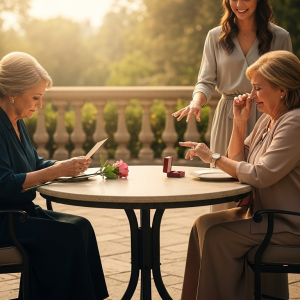I am the second youngest of five kids. In the chaotic ecosystem of my family, that has always meant my voice was the quietest, my needs the most easily overlooked. My older sister, whom we’ll call X, is five years my senior. We never had that cinematic sisterly bond. To her, I was a burden, an inconvenient afterthought. Her need for control was apparent even when she was a child; if it was my turn to pick the family movie, her night was ruined. At eighteen, I was used to it. I thought I understood the rules of our family. I was wrong.
The catalyst for the implosion was, as it so often is, a wedding. X, now twenty-four, got engaged to her boyfriend, Y, in a grand, performative beach proposal with giant white letters and a carpet of rose petals. My parents were thrilled. My older siblings were happy. And I, as per my mother’s decree, was roped in as a bridesmaid.
What followed was not wedding planning; it was a campaign of tyrannical control disguised as bridal anxiety. The demands were delivered via a shared spreadsheet, each line item a new financial and emotional burden.
- All thirteen bridesmaids were to pay for their own $300 blush pink dress, plus shoes, hair, and makeup. Alterations were also out-of-pocket.
- Attendance was mandatory at all events, including an $800 spa day and a bachelorette weekend in Toronto at the Fairmont hotel.
- All bridesmaids were required to attend every vendor appointment—cake tastings, catering meetings, venue tours—at a cost of $25 per person, per tasting.
- Guests were required to pay a $150 deposit to “reserve their spot” at the wedding.
- Gifts were to be cash, a check, or items from her meticulously curated registry. She announced she would be returning any gift that didn’t match her “theme.”
My mother waved it all away. “It’s just bride anxiety, honey.” I knew better. This was my sister trying to control the entire world, and we were her unwilling subjects.
The rules became more personal, more insidious. All bridesmaids had to attend hair and skin appointments every six weeks—at our own expense—to ensure we were “flawless for pictures.” Anyone with tattoos had to cover them. Our hair had to be dyed a “natural color,” or we could wear a wig, again, at our own expense. The dresses only came in sizes 0-10; those of us who didn’t fit were “expected to try to lose weight.” I’m a size 12. My sister sent me a keto diet book from Amazon.
The final straw for me was the cost. Her fiancé is a tech developer making well over six figures, and she’s a successful accountant. They could afford this. I, on the other hand, was saving every penny for my first year of university, a tuition bill of $17,000 that I was expected to pay entirely on my own. The bridesmaid “honor” would cost me over $2,000, money I simply didn’t have without taking on crippling debt.
I tried to talk to her. “It’s your job as my sister to save up,” she’d said, her voice devoid of empathy. My parents, who were footing the nearly $100,000 bill for the wedding itself, claimed they couldn’t help me with the bridesmaid costs. The math didn’t add up. The unfairness was a lead weight in my stomach. I knew I had to talk to them, to make them see. Supported by my aunt—my godmother and the only person who ever acknowledged my mother’s “nuts” behavior—I prepared to confront them.
My mother, a master of avoidance, put off the conversation for a week. First, she wasn’t “feeling well.” Then, we were all busy moving X into her fiancé’s condo. By the time things settled, she had “forgotten” we needed to talk.
When we finally sat down, I laid out my feelings: the financial strain, the blatant unfairness, the emotional toll of X’s demands. And that’s when my father’s face, usually so calm, went rigid. The color drained from it. It turned out, he had no idea about the full story. He knew they were paying for the wedding, but he had no idea about the spreadsheet, the mandatory spa days, or the $150 guest deposit.
He then revealed something that changed everything. For each of their five children, my parents had set up a $25,000 trust account, intended to be used for post-secondary education or a down payment on a house, accessible at age nineteen. I had just turned nineteen. My dad was preparing to sign my money over to me.
But my mother, shamefaced, had a confession.
Shortly after the engagement, X had come to her, weeping, playing her favorite card: the neglected middle child. In a long, manipulative conversation, X had convinced my mother that because her two older brothers were in the military (with their education and housing paid for), their two $25,000 accounts were sitting unused. That, combined with X’s own account and mine, totaled exactly $100,000. It was the perfect budget for her perfect wedding. My mother, consumed by a guilt I didn’t yet understand, had agreed. She figured that since I had saved $17,000 on my own, she could just divert my funds now and give me $5,000 “later.”
My father was silent, his fury a palpable force in the room. He looked at my mother, not with anger, but with a profound, crushing disappointment. Then he asked me to go to my room so they could talk. An hour later, my mother knocked on my door. Her eyes were red, her composure gone. And she finally told me the whole story.
When I was born, she had suffered from a severe postpartum depression that required her to spend four months in a treatment facility. My father was left to care for our two older brothers, then nine and seven, and me, a newborn. The task was overwhelming. A live-in nanny was hired primarily for me. My sister, X, who was only five, was caught in the middle. She had food, clothes, and shelter, but she had lost her mother, and her father was stretched too thin. She was, for all intents and purposes, emotionally abandoned at a critical age.
When my mother returned, X held a deep grudge, not against the mother who left, but against the baby who had caused her to leave. It was then that the incident occurred. What my family had always brushed off as a “funny story” was, in fact, the moment my five-year-old sister tried to end my life by smothering me with a pillow. My mother caught her just in time.
The family’s coping mechanism was to downplay it, to turn horror into anecdote. But the truth was, they knew something was deeply wrong. X was in therapy from ages seven to ten, but she was smart, even then. She learned to tell the doctors exactly what they wanted to hear. My mother, consumed by guilt, spent the next two decades trying to pay an unpayable debt, giving her “little dove” everything she desired to make up for those four months. X, in turn, learned that her mother’s guilt was a currency she could spend at will. The wedding was just her largest-ever withdrawal.
My father, now armed with the full truth, was a changed man. He immediately called X and demanded she come home. She tried to make excuses, but he was immovable. She hung up on him and blocked his number.
While we waited, my father read this very post, the anonymous vent I had written to strangers on the internet. He read the comments, the validation from people who saw our family’s dysfunction with clear eyes. When he was done, he looked at my mother, his voice shaking with a quiet rage. “How could you let this happen? How could you let one child terrorize another and call it love?”
When X finally arrived five hours later, she was sweet as pie until her mother-in-law, who had dropped her off, was out of sight. The moment the door closed, the mask dropped. “Why did you disturb my peaceful evening?” she demanded of our father.
What followed was the ugliest argument I have ever witnessed. It was a storm of yelling, tears, and vicious manipulation. X threatened to cut them off, to deny them access to future grandchildren. She worked on my mother, trying to pull her back to the original $100,000 plan. But my father stood firm, a rock against her hurricane.
The fight stopped when he finally roared, “Your mother is not your punching bag! And her PPD is not a weapon for you to use against her! If you are that angry about something that happened when you were five, then you need to go back to therapy!”
I was called back downstairs. We went through all of it, point by painful point. The keto book. The demands. The lies. X tried to defend herself by calling me “fat and lazy,” but my father shut her down instantly. Finally, defeated and “attacked,” she called an Uber and left.
In the quiet aftermath, we began to piece things together. My father and I went to the bank the next day. He paid the cancellation fee for the student loan I had taken out and transferred my full $25,000 into a secure account in my name. My parents insisted on paying for my first year of university and housing themselves. The wedding budget was slashed. X would get $15,000—just enough to cover the non-refundable deposit on her $10,000 dress and a few other essentials. Her in-laws, horrified by the truth, agreed to contribute another $15,000. X would not be having her dream ski-hill wedding.
She blamed me for everything. In a final, venomous text, she banned me from the wedding and from her life. I felt a profound sense of relief. I didn’t lose a sister. I lost a bully.
It’s been three months. Family therapy, which now includes my two brothers who were given temporary leave from overseas, is going well. My mom and I are closer than ever; it feels like getting my best friend back. My father has become my fiercest protector.
I’m loving my new life at university in Ottawa. I have three virtual therapy sessions a month, and I go home for one in-person session, where I can see my family slowly healing.
My oldest brother is getting married next year to a wonderful woman who has already become the sister I never had. She has asked me to be her Maid of Honor. And I have a boyfriend. He’s in the army too, and he’s kind and supportive. Life, for the first time, feels full of promise.
As for X, she and her fiancé moved their wedding up to November. A friend who still follows her on social media tells me the photos looked perfect. She is pregnant, and they have bought a house. She remains completely cut off from us, and her new in-laws have apparently taken to bad-mouthing our family. We’re holding strong.
The most important lesson in all of this was not about weddings or money. It was about boundaries. It was about learning that a real family doesn’t demand you set yourself on fire to keep them warm. They bring you a blanket. I am finally learning to recognize the difference.
Three months passed since X’s wedding. My life had found a new, peaceful rhythm. University in Ottawa was a breath of fresh air, and my relationships—with my new boyfriend, with my future sister-in-law—were teaching me what real, unconditional support felt like. But beneath the calm, there was unfinished business. My family, what was left of it, was beginning the difficult work of therapy.
The office of the family therapist, Dr. Anya Sharma, was a calm space with soft armchairs and gentle lighting, but the tension between us was thick enough to cut with a knife. My two brothers had been given temporary leave to join us. They sat in their military uniforms, looking out of place and uncomfortable, like soldiers called to a front they didn’t understand.
“So,” Dr. Sharma began, her voice gentle but firm. “We’re here to understand the family system. To understand why one child feels like an outsider, while another feels the weight of the world on her shoulders.”
In that first hour, my brothers spoke. They admitted their own ignorance of the severity of the problem. “We’ve been away from home for a long time,” my eldest brother, Mark, said. “We knew X was difficult, but we had no idea it was this bad. We should have been paying more attention.”
My father, who had become my staunchest ally, owned his role. “I buried myself in work,” he said, his voice heavy with regret. “I let my wife, who was struggling with her own issues, handle the emotional side of things. I failed to protect my daughter, Anna (the narrator’s name), from her sister. I wasn’t present.”
My mother, thinner and more fragile now, wept quietly. “I let my guilt steer me,” she whispered. “I was so afraid of X hating me again, of hurting her again, that I gave her everything she wanted, even when it hurt my other children. I tried to fix the past by ruining the present.”
Dr. Sharma nodded sympathetically. “But there is one person not in this room,” she said softly. “And X’s absence is as loud as everyone’s presence. To truly heal, we need to understand her perspective, even if it’s difficult to hear.”
She proposed that we invite X to a single session. Not for a reconciliation, not to force an apology, but simply for everyone to be heard in a safe space. My father was skeptical. My mother was terrified. But my brothers agreed it was the right thing to do. The task of making the call fell to my second oldest brother, David, who had always had the most neutral relationship with X.
David’s call with X, as he recounted it, was a tense negotiation. At first, she flatly refused. “Why would I go? So you can all attack me again?” she had scoffed.
David, with a soldier’s patience, didn’t argue. He simply said, “No one wants to attack you, X. This is a chance for you to tell your truth, to explain how you feel in front of a neutral party. Mom and Dad are really trying to understand. You don’t owe it to them, but maybe you owe it to yourself to be heard.”
It was that appeal to her ego, to her sense of victimhood, that worked. She agreed to come, not to heal, but to “set the record straight,” to prove to us all how wrong we were. She was walking into therapy as if it were a courtroom where she was both the prosecutor and the star witness.
When she entered the therapy room the following week, the energy immediately shifted. She carried with her an aura of cold defiance. She was about four months pregnant, and she rested a possessive hand on her stomach, a gesture that was both protective and a reminder of her ultimate weapon: the grandchild my parents so desperately wanted. Her husband, Y, was not with her. She came alone.
Dr. Sharma began the session masterfully, setting ground rules: no interruptions, no shouting, speaking only from one’s own feelings. X sat in silence, a smirk playing on her lips.
The session started with my parents. This time, they weren’t talking to me or my brothers. They were talking to X. My mother, her voice trembling but clear, began.
“I’m sorry, X,” she said. “When you were five, I left. I was sick, but you couldn’t have understood that. You only knew your mother was gone. I left you when you needed me most. I failed you, and I spent a lifetime trying to make up for that failure in all the wrong ways. I am so sorry.”
My father followed. “And I’m sorry, too. I was overwhelmed, and I didn’t pay you the right kind of attention. I didn’t see how deep your pain went. I should have done better.”
X listened, her face unreadable. This was what she wanted to hear, their admission of guilt. But then, Dr. Sharma gently pivoted the conversation.
“X,” she said. “Thank you, both, for sharing that. Now, can we talk about what happened after your mother came back? Can we talk about the pillow?”
The room seemed to grow colder. X’s smirk vanished. “That was a stupid joke,” she said. “Anna is blowing it out of proportion.”
“Is that how it felt to you at the time, Anna?” Dr. Sharma asked me.
I took a breath. “No,” I said softly. “I didn’t feel anything then. I was an infant. But growing up, hearing it told as a joke, I felt confused. And now, I feel horrified.”
“X,” Dr. Sharma said, turning back to my sister. “That act was not the act of a happy child. It was the cry for help of a child in pain. But it was also an act that caused a deep trauma to your sister and your family. We are not here to place blame, but to acknowledge that pain.”
“Her pain?” X roared, her composure shattering. “What about my pain? I was the one who was left! I was the one who had to raise myself! Everything is always about Anna! Even now, this therapy session, it’s about her! You’re all ganging up on me!”
“We’re not against you, X,” my father said, his voice sad. “We’re trying to understand.”
“Understand what?” she screamed, rising to her feet. “That I suffered, and now that I finally have my own happiness, you want to ruin it by dredging up the past? Anna has poisoned you all against me. She took my wedding from me, and now she wants to take my family!”
“No one is taking anything from you, X,” my mother said, her voice firm for the first time. “These are the consequences of your choices.”
That was the line that broke her. It was the ultimate betrayal. Her enabler had finally held her accountable.
“Consequences?” she laughed, a bitter, ugly sound. “Fine. Here’s a consequence.” She turned to me, her eyes burning with a cold fire. “You will never meet my child. You understand? None of you will. I am done with this family.”
She turned and stormed out of the room, slamming the door behind her. The sound of it echoed in the stunned silence she left in her wake.
We sat there for a long time. Finally, Dr. Sharma spoke. “Well,” she said gently. “Now we have our answer.”
There was no healing with X that day. Only a final, clean break. But for the rest of us, it was a breakthrough. The truth, in all its ugliness, was finally out in the open. Looking around the room, I didn’t see a broken family. I saw survivors. My parents, my two brothers, and me. We had survived the chaos of X.
I knew the road ahead would be long. But for the first time, I felt we were walking it together, not papering over the cracks, but learning to live with the scars. We couldn’t save X from herself, but we could, finally, begin to save ourselves.




